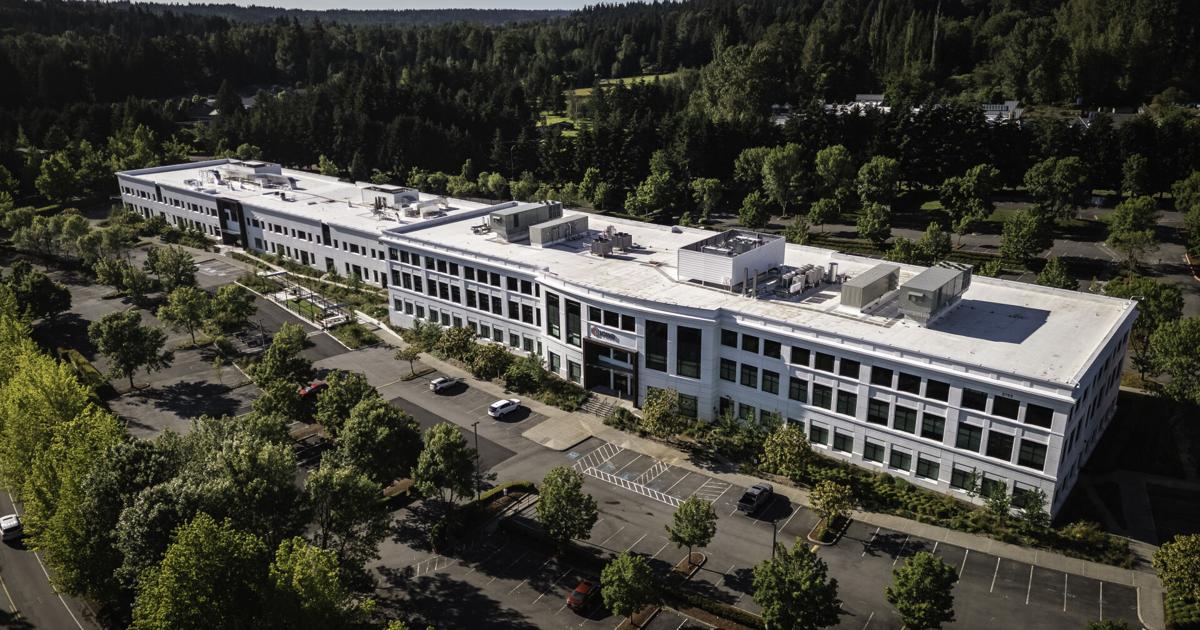IonQ opened this quantum computing manufacturing facility in Bothell last year. A quantum data center, it provides cloud access to IonQ customers and is IonQ’s primary production-engineering location in the country.
Courtesy IonQ
Maryland-based quantum-computing and networking company IonQ, whose primary quantum-computing production site in the United States is in Bothell, will acquire United Kingdom-based Oxford Ionics in a deal valued at $1.075 billion under an agreement the companies announced this week.
The management teams believe the transaction, expected to close this year, will enable the combined company to pioneer breakthroughs in quantum computing. IonQ said in a news release announcing the deal that it expects combining with Oxford Ionics will help drive the creation of disruptive applications that enable substantial revenue growth opportunities.
IonQ develops high performance quantum-computing systems based on trapped ion technology to help solve the world’s most complex commercial and research challenges. Oxford Ionics holds the current world records for fidelity, which measures the accuracy of quantum operations, the release said.
The transaction will bring together IonQ’s quantum compute, application, and networking stack with Oxford Ionics’ ion-trap technology manufactured on standard semiconductor chips. The combined technologies are expected to deliver innovative, reliable quantum computers that increase in power, scale, and problem-solving capabilities, the companies said, adding both expect to benefit from the other’s complementary technologies, expertise, and IonQ’s global resources and customer base.
According to the release, the combined company expects to build systems with 256 physical qubits at accuracies of 99.99% by 2026 and advance to more than 10,000 physical qubits with logical accuracies of 99.99999% by 2027. The combined company anticipates extending its innovation by reaching 2 million physical qubits in its quantum computers by 2030, enabling logical qubit accuracies exceeding 99.9999999999%
Bothell impact
Asked how the Oxford Ionics deal could affect IonQ’s operations in Bothell and whether it could result in more manufacturing of quantum computers or more hiring, the company responded via email: “Our Bothell manufacturing facility is central to IonQ’s development of next-generation quantum systems. The integration of Oxford Ionics’ record-setting quantum fidelity and proprietary qubit control technologies will help accelerate our roadmap toward achieving 2 million algorithmic qubits by 2030. Bothell is our manufacturing home, and this announcement only reinforces our commitment to invest $1 billion in the Pacific Northwest over the next decade and to establish Bothell as a global hub for quantum innovation.”
An expansion of the Bothell facility, announced last year, continues, the company said.
IonQ engineer Walker Steere, middle, speaks with U.S. Sen. Maria Cantwell of Washington at the grand opening for IonQ’s new Bothell manufacturing facility in February 2024. Displayed in the foreground is an early version of IonQ’s vacuum chamber for trapped ions.
File photo courtesy IonQ
The Oxford Ionics transaction will consist of $1.065 billion in shares of IonQ common stock and about $10 million in cash, subject to customary closing adjustments and expenses, this week’s release said.
Oxford Ionics’ team is expected to play a vital role in the combined company’s future. Both Oxford Ionics founders, Chris Ballance and Tom Harty, are expected to remain with IonQ after the acquisition is completed, continuing their work on quantum technology development in the U.K. The combined entity also plans to expand its workforce in Oxford.
The combined company expects to maintain all existing customer relationships, including government partnerships, in the U.K. and U.S.
“IonQ’s vision has always been to drive real-world impact in every era and year of quantum computing’s growth,” IonQ CEO Niccolo de Masi, said in the release, adding the acquisition “accelerates our mission to full fault-tolerant quantum computers with 2 million physical qubits and 80,000 logical qubits by 2030. We believe the advantages of our combined technologies will set a new standard within quantum computing and deliver superior value for our customers through market-leading enterprise applications.”
Oxford Ionics’ ion-trap-on-a-chip technology will accelerate IonQ’s commercial quantum-computer miniaturization and global delivery, he said. “Our combined path to millions of qubits by 2030 will help ensure unit economics, scale, and power as quantum computing rapidly evolves.”
Oxford Ionics’ Ballance, added, “At Oxford Ionics, we have not only pioneered the most accurate quantum platform on the market — we have also engineered a quantum chip capable of being manufactured in standard semiconductor fabs. We look forward to integrating this innovative technology to help accelerate IonQ’s quantum computing roadmap for customers in Europe and worldwide.”
The announced acquisition of Oxford Ionics follows IonQ’s recent acquisition of Lightsynq and pending acquisition of Capella Space Corp.


